A Conversation 38,000 Feet Up With The Two-Time Kona Ironman World Champ
I’m phobic about flying and didn’t want to be squeezed between strangers on the 14-hour flight from Sydney to LAX, so I chose a seat in the rear of the Qantas 747 where I’d have only one person at my side. Whose elbows would I bump as we ate over our trays, whose knees would I climb over to get from my window seat to the aisle? From seat 70K, I guardedly watched the flow of humanity funnel through the Economy section. Would it be Mr. No-Neck with the upper body spilling out of a tank top that pictured an airbrushed Harley, or the gray-haired lady wearing an inflatable pillow like a neck brace and dangling shopping bags like ornaments? Please no, please no, I silently prayed.
And then I saw him standing patiently behind a turban-wearing man and sari-wearing woman who were taking an inordinately long time to stuff the overhead bin. I blinked, and there he was: a perfect specimen, thirtysomething, with dark hair, chiseled cheekbones and a tight black polo shirt that revealed sculpted arms. He looked unperturbed by the people blocking his way and seemed unaware that he turned heads like Heidi Klum in a hardware store.
He looked at the empty seat next to me, then right at me, and then smiled. Yes, thank you, thank you, I silently prayed again.
He slid into 70J and said a polite hello. I did not recognize him. At first I thought he might be a model, but then I noticed the muscles and veins on his tanned forearms and hands — puffed-up veins under the skin that signal extreme cardiovascular fitness — and I doubted a model would be so healthy. I put my nose back in my book to give him his space. He thumbed through the in-flight magazine. We sat in silence until at about the same time we put down our reading, turned to one another and made small talk.
“What do you do?” I asked him.
“I’m a professional athlete,” he said in a lilting Aussie accent, as unassuming as if he had said, “I work in an ice cream shop.” I prodded further about his sport and he said, “I do triathlons.”
I told him I’m a runner and he smiled politely, the way Lance Armstrong might smile at someone who says she likes to bike, and the subject changed to family and travel. I told him I was sad to be traveling without my husband and two kids. His face lit up — two kids? He told me he has two, too, a boy and a girl who are younger than mine but the same age spread. He had a rough night’s sleep due to his 9-month-old, and I could relate. Then we talked about my travel, and he could relate, and as our conversation rolled amicably along, I realized with a mixture of disappointment and relief that there was not a scintilla of flirtatiousness between us. Someone could have labeled us Frumpy Older Sister and Cute Younger Brother.
I still didn’t know who he was.
Only gradually did I learn that luck had seated me — the amateur runner who treasures her small collection of trophies from local races, the 40-year-old who wonders if she’s too old to make dreams of going faster and longer come true — next to a world champion endurance athlete with legions of fans and a long list of sponsors. It took about 12 hours of talking off and on, of sleeping side by side, for me to catch his name: Craig Alexander, the guy known to triathletes everywhere as “Crowie.”
I learned little things about Craig early on in the flight: he eats with his left hand but writes with his right; he prefers tea to coffee; he likes to play guitar but never has enough time; his favorite cocktail is a margarita. But I had no inkling of his athletic prowess until he revealed that Competitor Magazine was flying him to California to attend the Endurance Sports Awards ceremony. He wasn’t sure what award he was going to get. (It turned out to be Triathlete of the Year.) I gently prodded further about his training and racing. He said he does a lot of shorter distances and builds up to the Ironman championship in Kona, Hawaii, in October.
“So,” I asked casually, “how’d you do in Kona?”
Little did I know that’s sort of like asking Michael Phelps, So, how’d it go for you in Beijing?
“I won the last two years,” he said.
Holy cow. I inwardly winced and then laughed at my cluelessness. I also laughed at how my negative stereotype of triathletes — that they’re egomaniacs prone to divorce and obsessive behavior — had been upended by this unpretentious gentleman next to me. And I laughed because I was punchy from the double whammy of a sleeping pill and an anti-anxiety pill I had taken to help me get through the bumpy flight (did I mention I hate to fly?).
When we both decided it was time to sleep in the dimmed cabin, I asked him if I could interview him after we woke up. Of course, he said graciously, and then he dozed off. I reclined next to him, my nose two inches from his prize-winning shoulder, and for once I slept soundly on a plane.
The cabin lights came back on several hours later, the captain’s voice informed us that LA was about an hour away, and I said good morning to Craig. I hoped he didn’t notice the dried drool in the corners of my mouth.
He didn’t mind me asking questions and taking notes on his answers. He began by describing the season ahead, when he’ll start with a couple of tris in Australia, do one in Singapore in March, and then live with his family in Boulder to train and race in the States from April through October. “The hope is just to have a consistent season,” he said. “Hawaii is my main race, so the season will be built up to that.”
Are you looking forward to it, or is it a huge amount of pressure, or both? “It is a lot of pressure; it’s a lot of pressure on my time — I’ll have a lot more media to do and sponsorship commitments. But as far as the race the goes, I’ll just try and do what I always do, which is control what I can control — my training — and I think a lot of the fun is just getting in great shape.”
I laughed, “Like you’re not now?”
“I’m in good shape now, but I’ll be in my best shape in October.” He described his peak training blocks, which occur three times a year (January, March, August) with three-week periods of about 40 hours of training per week. Those weeks feature about 12 to 15 miles of swimming, 400 to 500 miles on the bike and about 60 to 70 miles of running.
I had noticed he ate the gloopy beef dish that the airline served for dinner. Did he have any special diet requirements, or does he eat pretty much whatever is placed in front of him? “I just eat a normal diet, nothing crazy,” he said. “That’s the thing about traveling, too — you can’t be too particular.” What about alcohol? “Leading up to Kona I usually have a beer or two at dinner, mainly to keep the calories coming in because I’m training so hard.”
I was curious to know what it’s like being a pro and having to make a living at his sport, which he’s been doing for 11 seasons. The question seemed to open a valve that let out some steam. “The downside is the mental pressure of knowing that, first of all, you have no excuses — it’s not like you can say your job got in the way, because that is your job,” he said. “And I think there’s the pressure of wanting to vindicate your decision” to be pro and devote your life to it.
He talked about how he got a degree in physiotherapy from Sydney University but never practiced; instead, he plunged into training and racing full time. “There comes a time when you realize it has to be viable financially. It’s great to chase a dream, but you also have to live.”
Then I asked if he can ever let himself relax a bit and more fully enjoy the swimming, cycling and running. “I am now, but it’s taken a fair while to develop it,” he said, referring to the ability to relax and truly take pleasure in his chosen profession. “It’s almost like it’s come full circle: you start off in this sport because you love it, then it becomes your profession and there’s a lot of pressure associated with it, and it does feel like a job some days — the fun gets diluted when you get injured or ‘I need to get back and make money,’ and there’s the pressure to perform — but if you’re lucky enough to have success, then you get back to the part where it’s fun again.”
So, I noted, it sounds like his stress level is lower, but his expectations are as high as ever. “For me, my own expectation is greater than anyone else’s,” he said.
When he’s not training, what does he do for fun? “Just be a dad, that’s it,” he said. “I really like to spend most of the time with the family. I used to surf a lot, and I play golf every now and then.”
Alluding to my love of trail running, I asked if he ever gets off road. “I love to run off road,” he said, lighting up again and smiling. “As far as biking goes, I don’t do much off road, but I will when I retire.”
Retire? When? Why? “At this stage I’ll just take it one year at a time. I’m 36 years old, and from a performance standpoint I think I’m still improving, but I think the decision to retire will be based more on other things.” Like what? Like where his head and heart are. “Mentally when you’re not prepared to do the work required to be competitive at this level, that’ll be the deciding factor, because I think physically I’ll be capable at this level for years to come.”
I asked him about burnout — has he battled it yet? “Not really, no, I still really enjoy it. The fun and challenge are all sort of linked for me — the challenging aspect is what’s fun.”
It was almost time to land, almost time to say goodbye. I asked him one of the most clichéd but irresistible questions: How does it feel to finish first at the Ironman World Championships in Kona?
“There are a lot of emotions,” he said. “You’re totally spent, so there’s a lot of relief you finally made it. You’re relieved it’s all going to be finished. There’s a lot of pride, too, that you’ve lived up to your own expectation.” He paused and looked pensive. “It’s kind of dream-like because I’ve visualized the race a lot and train on the course a lot, so there’s an aspect of, ‘Am I just thinking about it again or is it real?’”
“Kind of dream-like” — that pretty well describes my flight.

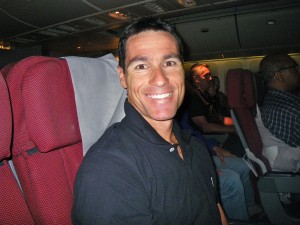
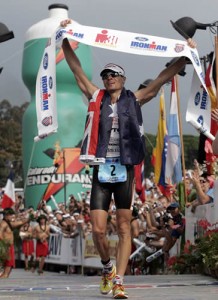
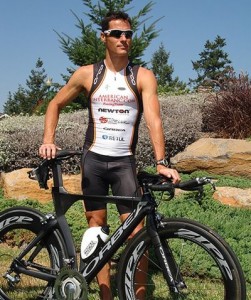
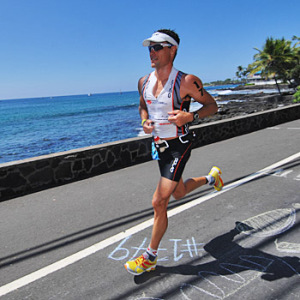
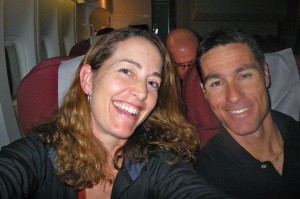
Great Blog post…Lucky gal to be able to pick the brain of Crowie!
Great article. I’m a fan of endurance sports and I’ve been following up the Ironman Hawaii since the beginning.
Good stuff SLS. Welcome to the wonderful world of triathlon. I’m assuming now that come the 2nd Sat of October you’ll be watching intently and cheering your ‘boy’ on.
Did you at least get a hug good-bye?
Ha ha David … no, no hug goodbye. And on the 2nd Saturday of October, I hope to be in the hills doing the Firetrails/Goldenhills! I’m thinking of bumping up from 26.2 to 50M … if you help me, that is.
“how’d you do in Kona?”
Very cool article! Thanks for posting it!
Haha I like the last picture
Sarah
A great article. I really enjoyed your fine writing about a chance encounter.
Great blog post Sarah! I wish I had have had this opportunity, but just as thankful to be able to live vicariously through you! I had a brief encounter with Crowie behind the scenes at the World Long Distance championships in Perth last year. Your story has confirmed to me what an unassuming bloke he is. Thanks for sharing your experience!
Thanks for sharing. Crowie is a great guy.
Ahhh…lucky you! What a great guy and great blog.
Wow, wow, wow. I can’t even imagine. I know he has to sit next to somebody, but still, what an amazing experience. I’m glad he was able to alter your view of triathletes a bit, I find that the better they are the more humble they are.
I recently interested about Triathlon, and this article must be a dream come true for you Sarah. Congratulations!
Sarah,
Great article writing about Craig. I was also interested in your other article about running in New Zealand. I have since moved from Sydney to Wellington NZ and love the trail running with an excellent Xterra series.
Keep up all the good work.
James..
Sarah
I did the St. Anthony Triathlon in St. Petersburg Florida today. Craig took 3rd pro. Pretty slick for an early season race that had the big guns entered.
http://satriathlon.com/
I passed along my regard for your article about Craig through his Newton Shoe sponsor and directed him to it. I told my wife about it and just made her a copy.
I hope you are continuing your writing.
Best regards
Dave Black
Really enjoyed this article and the one on Ann Trason. Your insight and interactions with your subjects are priceless!
Hahaha! I love your article. I had to read it slow because I did not want it to end. I have met Crowie this year at St. Anthony’s Tri in St. Pete, FL. He really is an awesome and very humble person. My husband, Christopher met him the first time last year the day before the Clearwater 70.3 Ironman Championship and was privileged enough to be at breakfast with him. That’s when my husband got an autograph from him. I was so thrilled. All pro athletes could learn something from Crowie.
What a great article and incredible luck you had!
Ahhh!! Not sure how I just saw this post now but I can’t believe you sat next to Crowie – and didn’t know who he was! I don’t think I would have been able to talk. Did you see him run yesterday? Amazing. You definitely need to reconsider your triathlete stereotype – I have met so many amazing people. Next you have to get to sit next to Chrissy Wellington.
I watched Craig win and remembered your extraordinary piece.
I hope you are and your family are well
So I realize this is old, but what an awesome experience! So cool to have been able to get some time to just talk with a guy like that!
I don’t know if Crowies’ a Christian but he epitomizes much of what i’d like to see/hear from a Christian athlete. What a “class-act” he is.
Not sure if his “as the Crowe flies” book tells much of what a triathlete would LOVE to know about both his personal/professional (training) routines/experiences/etc but he’d make one “heckava” coach that many would vie for his “time.” Thanks for posting SLS, u blessed person you!
>: ) V2b